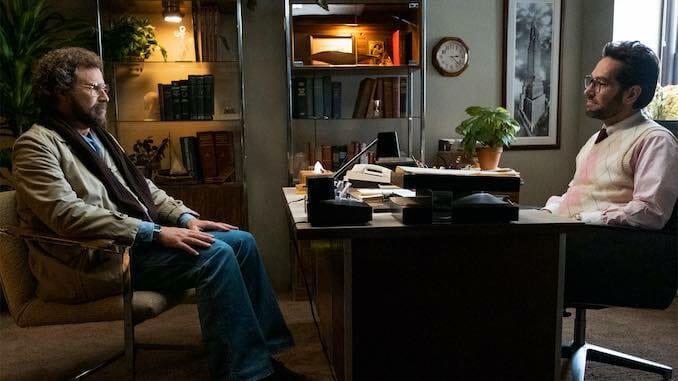The Shrink Next Door Showrunner Georgia Pritchett on Toxic Friendships and True Crime
Photos Courtesy of Apple TV+
This week, Apple TV+ will debut its newest original, The Shrink Next Door. The series stars Will Ferrell as Marty Markowitz and Paul Rudd as Doctor Ike Herschkopf, a patient and therapist who become trapped in a manipulative relationship that pushes all boundaries. The story is based on the nonfiction podcast of the same name that detailed the decades long con.
I recently had a chance to talk with The Shrink Next Door’s showrunner and executive producer Georgia Pritchett, a writer on series like Veep, Succession, and The Thick of It, to discuss the new series, podcasting, and her career of writing about immoral characters.
Paste: The Shrink Next Door is based on the podcast of the same name, what drew you to this story initially?
Georgia Pritchett: I just loved the podcast, I listened to it. And then I was so fascinated by the story, I listened to it again immediately. I had no idea they were going to make it into a TV show, so I was really excited when I heard they were. You probably know that Will [Ferrell] and Paul [Rudd] were both competing for the rights to the story, because they both loved it so much, and wanted to be in it. So when they kind of joined forces and invited me on board, it was like a dream come true. Because, you know, it’s a fascinating story. And then with, you know, the most incredible cast attached, so it was just a wonderful opportunity.
Paste: Among podcasts, the true crime genre has blown up in popularity. I was wondering how you would fit the story of Marty and Ike into the greater genre of true crime?
Pritchett: Yeah, I agree. It’s kind of a true crime, but it’s not a whodunnit. And because I knew some people watching the show would have listened to the podcast, and some weren’t, I wanted to write it in a way where it works, however much you know, or don’t know, before you watch it. My feeling was, rather than make it hinge on what happens, that to kind of blow that in the first 10 minutes and say “This is what happens by the way, it goes really badly wrong.” And instead let people enjoy finding out how that happened, and why that happened. And to me, the sort of psychological story beneath that was what was fascinating, and what I kind of focused on when adapting it.
Paste: One thing that I ended up really enjoying about the series is how it takes place over the decades, like a time capsule from the ‘80s to the modern day. As a writer, how was it to go through the past few decades and revisit all these time periods?
Pritchett: It was really fun. There was a lot to get in. And I think our art department and costume, hair, and makeup did an incredible job of recreating that world in a really authentic way. And the music, all of that helped us sort of track the time—as well as kind of being fun and great to look at, it was a sort of really important part of the show in terms of grounding the story and making it feel authentic. And in terms of the story, I spent the first four episodes trying to get the audience to get to know the characters and the world to feel invested in them and in their relationship. And then the next four episodes really kind of gallops through the years, in a way I think we can all feel; sometimes suddenly it’s 10 years later, like what happened? And I think that’s certainly reflected Marty’s experience when I spoke to the real Marty, that he sort of had this sensation of waking up and almost 20 years have past. So in the second half we kind of play with time a bit; it feels a bit disorientating and a bit confusing, and that’s kind of to reflect Marty’s experience.
Paste: Was there one decade in particular that you enjoyed going back to?
Pritchett: Well, as I grew up in the ‘80s, of course, I loved revisiting that. And I still seem to have a pretty ‘80s haircut. So I didn’t feel that I stood out anymore, because everyone had big hair. I love the music of that time, but of course, I’m British. So it was really interesting to me to see the clothes people were wearing over here and the cars they were driving. And that was really exciting, it was like going back in time. I enjoyed that a lot.
Paste: You started talking about the element of “you blink and 30 years have gone by,” because the show has this interesting kind of tonal balance. It’s very funny, and you have a lot of comedic actors, but then it’s also deeply disturbing underneath. How do you reconcile these two very different tones into one cohesive show?
-

-

-

-

-

-

-

-

-

-

-

-

-

-

-

-

-

-

-

-

-

-

-

-

-

-

-

-

-

-

-

-

-

-

-

-

-

-

-

-








































